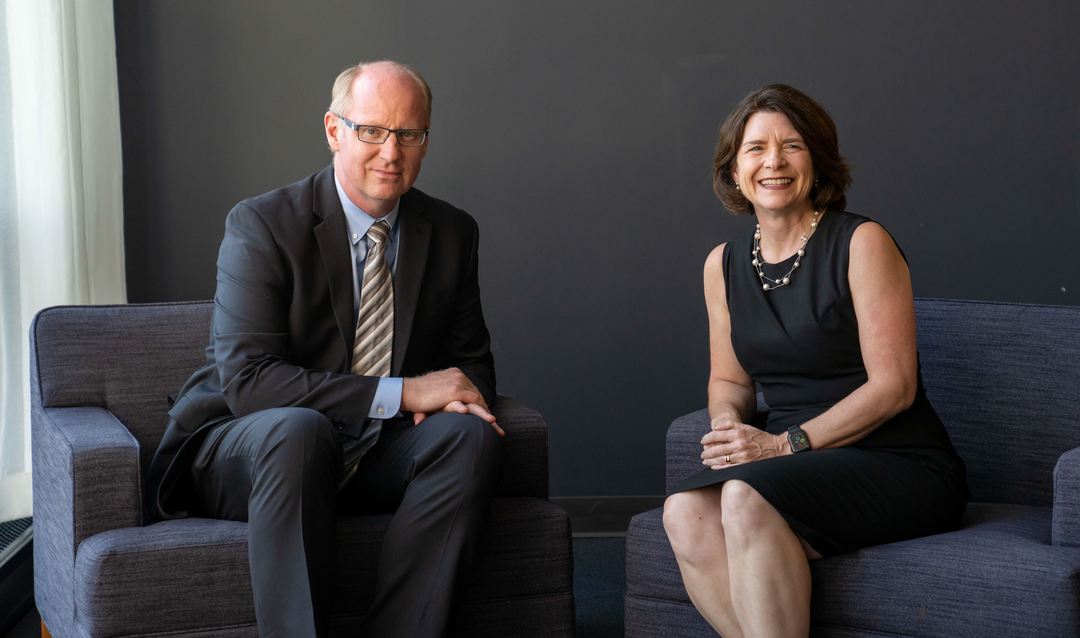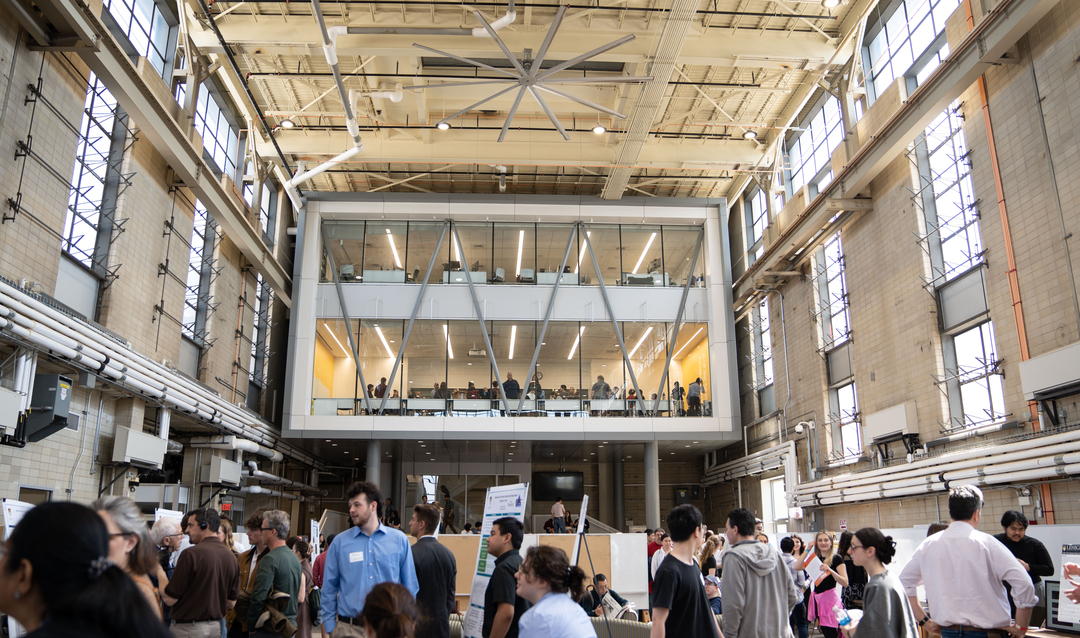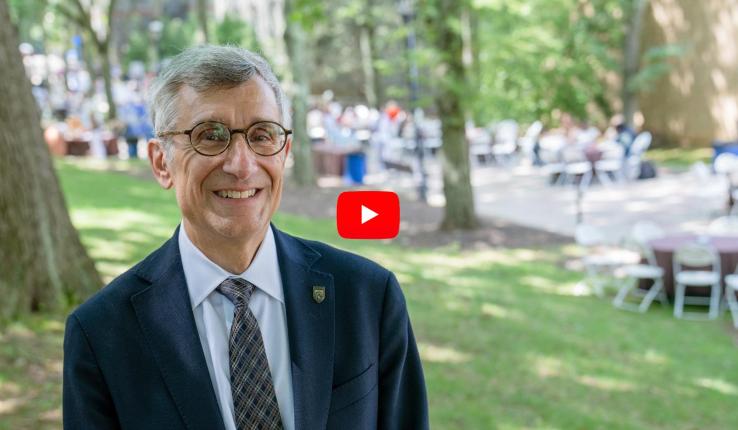Lehigh has a long history of interdisciplinarity. The plan talks about redefining an interdisciplinary education. How would that take shape?
Urban: We have some existing intercollege programs that do a great job teaching students in an interdisciplinary way. We're looking to expand the existing programs and create new programs of the same sort. We're also exploring the idea that, if students are very interested in doing interdisciplinary work, why do we, from day one when they arrive at Lehigh, force them to identify as being in the business college or the engineering college or in arts and sciences and the College of Health? Why shouldn't we let them be interdisciplinary at the beginning? Why shouldn’t we let them explore the full spectrum of things that are offered and not assume that all 18-year-olds know what it is that they want to do and how it is that they want to do it? We want to be able to provide them with an opportunity to discover that or explore that while they're here in their early semesters at Lehigh.
On the research side, the challenges that we will identify as areas of focus for research and investment are challenges that cannot be solved by people from a single discipline—issues related to health, issues related to sustainability and infrastructure, issues related to the kind of conflicts that are emerging in society today. Those are all topics and areas of research and scholarly work that require people to come together from a variety of different disciplines if we're going to even understand the problem, much less solve it.
Cook: Another element where we may see interdisciplinary engagement is to have graduate students engage with business, technology or the humanities to make sure that they have those skills ready for the world too. Those are the sort of timely and timeless skills the Ph.D. students asked for, and we think we can provide that, and it has the potential to elevate their career trajectory.
Urban: Ph.D. students, by the nature of the work that they're doing … answer novel questions. In some cases, that will lead to an opportunity to do something entrepreneurial. We want to make sure they have access to that knowledge and understanding of what it would take to be an entrepreneur—what are the first steps, what are the first 10 steps? If the idea that a Ph.D. student is working on through their thesis work has the potential for commercialization, we want to help them realize this potential..
In January, we offered for the first time a one-day workshop on entrepreneurship for doctoral students and for postdocs. It was a pilot, but we've now committed to doing that multiple times a year in order to expand the opportunities for doctoral students, recognizing that the typical faculty member at Lehigh can't teach their Ph.D. students about how to start a company because they've never done that.
The strategic plan identifies three areas of research for the university. How did those areas emerge? And will Lehigh move away from anything it's been known for?
Urban: In order to have an impact, we can't be spread too thin. We have to identify areas that we believe are going to be more important in 10 years than they are today and where we have some kind of initial advantage. We have to pick those areas and make a disproportionate investment. If you look across higher education, when universities have been successful through a strategic planning process or otherwise, in elevating the impact of what they do, elevating their visibility, it's always been by focusing on an area and deciding to be outstanding, to be the best in the country, the best in the world. So that's the approach we're taking.
Does that mean that over time we will need to make choices and not do some things? Absolutely. Does it mean that we're going to tell people, Oh, no, you can't go and work in this area that has not been identified through the strategic plan. Absolutely not. We have faculty here who do all kinds of things. This is really about looking into the future and saying, future resources are going to be put toward those three areas.
You talked about high impact, high risk. What are examples of that?
Urban: If we're talking about failure and risk, that comes up in a couple of different places. One is certainly in the educational domain. We want to make sure that students come to Lehigh and see opportunities to do things that they've not done before, things that they don't know whether they're going to be successful doing. … To do that, we have to make some of those activities less risky than they are today, because right now students are not, in many cases, willing to do the things that they're not already good at because of the cost of failure. Largely that comes from grades.
On the research side, we want to be able to provide opportunity for faculty to engage in questions and problems that are bigger than they can address alone. To do that, we need to help faculty identify team approaches to addressing these most important questions and problems in the world. Some of those teams will be largely Lehigh people, but we also see opportunities for partnership. Just because we don't have somebody here who's the world's expert on something doesn't mean that that's a problem we can’t contribute to trying to solve. …
Where I think it's important to talk about risk is actually in terms of our internal operations. Like all institutions, we do things a certain way because that's the way they've always been done. We need to look at empowering people—faculty, but I would say even more so staff across the university—to do things differently, to be willing to take a bit of a risk in terms of a different approach to how it is that we operate, a different approach to recruiting graduate students, a different approach to giving people in certain roles or offices a bit more authority so that they can make decisions more efficiently and effectively. …If we're going to ask you to take those risks, we can't have the consequences of “failure” be too severe. We have to be willing to support people when they're taking risks trying to do what's best for the university.
Cook: An organization of the future really means finding ways to be nimble as an organization, to empower people to take initiative to do things in new ways. Maybe leapfrog over some system that is available and push the envelope to achieve operational excellence, to be forward-thinking as an institution at all levels.
How specifically will Lehigh aim to foster belonging, cultivate partnerships and strengthen community?
Urban: I've used this statistic a number of times, but roughly half of the country thinks that higher education is a net negative for the country. That is a shocking statistic to me and if you ask why, it's about cost, it's about relevance of what we're doing, it's about, in some sense, what we teach and the political views that are expressed. If we're going to have the kind of impact that we want, we need to be trusted. If we want to be trusted, we need to earn people's trust. … That means a degree of transparency that we're not necessarily used to. That means we're doing what we say we're going to do. That means we have to provide value to people—students certainly but others who engage with us. …
We need to be communicating with all of our communities, all of our constituents about what's happening. We need to be soliciting input and feedback more frequently, perhaps, than we've done in the past. We need to make sure that we're talking about what we do, telling our story to as many audiences as we can.
Cook: We want to make partnering with us easy. Every interaction with every group, every person, should be positive and agile. That's internally as well as externally because we often forget that we are each other's constituents too. There needs to be an emphasis on making sure everyone feels empowered to take agency in that moment, to create a positive experience.
Urban: It's also important that we show some humility. We don't know what the most important problems or questions are out in the world. And we certainly don't know what the best solutions are all the time. … We need to make sure that we are genuinely engaging, genuinely interested in others' viewpoints, genuinely curious about the perspectives that other people bring through that process. …I think that will help to build that trust and help us to do a better job of making things together with different communities and different constituents.
How will you ensure that the plan isn't going to sit on the shelf? In holding itself accountable, how will Lehigh know if it’s successful?
Cook: We will have a public dashboard that measures our progress toward our goals, not the initiatives. …We plan to engage the campus with some regularity, but I would imagine it's probably quarterly conversations, where we touch base and say, This is what's happening, what does the community want to hear about? We will have an open dialogue. We want to make sure the campus continues to be apprised of what we're doing, but also we need to pay attention to external pressures that may require us to shift our goal a little bit, move the needle, move the goalposts.
It needs to be flexible or it's not adaptive. We hope that there's a level of continuous feedback that will allow us to make some adjustments along the way, but we will be monitoring our progress from day one. For instance, we're going to be measuring the return on investment. Are we really leading in those student outcomes? We will be measuring staff and faculty retention. The DI&E (Diversity, Inclusion & Equity) plan is fully embedded in this plan as well and the expectation is that we will measure all of those things, really fully implementing the DI&E plan.
Urban: By the fall, we will have a pretty good idea of some specific measurable outcomes that we're tracking over time. It'll be public, which I think will help us hold each other accountable. It also will make it clear what kind of progress we're making. There are things like student outcomes, graduation rates, but also gaps in student outcomes. Right now lower income students have a lower four- and six-year graduation rate than our non-low income students. That's a gap we want to close. Black students have a lower four- and six-year graduation rate than white students. That's a gap we want to close.
There are things we've already been tracking for years that will become integrated into this dashboard that will reflect this strategic plan. We'll be tracking research funding, and we'll also be tracking research outputs in terms of publications, books, journal articles. Some things are harder to measure. Activation of Mountaintop, how are we going to measure that? … What do we consider successful? … There's a lot of work to do to refine our thinking.






